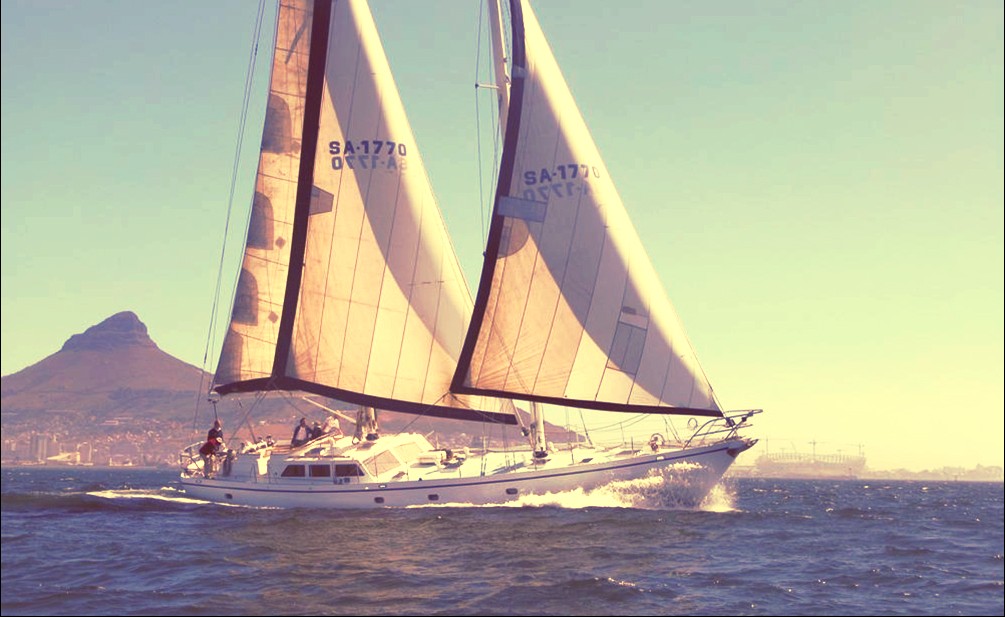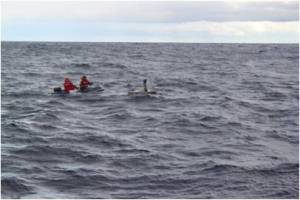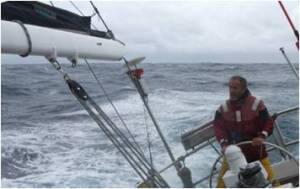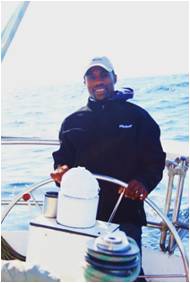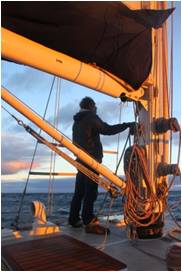Tales of Lady Amber: Report back, Voyage 21
Our Story,
Rescue
Southern Ocean.
There’s not a lot that can be said about the Southern Ocean: big waves, big seas, big winds and big cold! Since iron men in wooden ships first ventured into its waters, it has been feared – a nightmare of wind and water that even the most experienced of sailors reflect on it with stillness in their souls.
Our task: the rescue of a vessel, a vital piece of oceanographic equipment, no bigger than a surfboard, that had gone rogue in this vast desert of water and was steadily moving south to the ice pack where it would be surely lost, crushed… destroyed.
If you want to play in the big stuff, the secret is in the timing – the low pressure systems with wind forces of over 140 km/h march relentlessly from the barren Cape Horn at the tip of South America, angry at being squeezed through the Drake Passage and expand in the freedom of the Deep South Atlantic Ocean. Not a place for the feint-hearted and certainly suicidal in winter!
The date: June 20, two days before mid-winter. We were approached by Dr Sebastian Swart, the senior researcher of the CSIRO- Southern Ocean Carbon & Climate Observatory. “We have a SV-2 Wave Glider that isn’t responding to our commands. We think that the rudder is jammed and it’s drifting South West at about 2 knots. We are not sure how long we can keep up communication with the craft; if we lose comms, we lose the glider.”
I dubiously looked at the weather. Our vessel, the Lady Amber, was built for these conditions and our task over the past five years was just this: the deployment and retrieval of weather and data instruments in the oceans of the world. We have been specifically trained for this and besides, we were also the only research vessel in this hemisphere that could successfully carry out such an operation at short notice. A rescue such as this though, in the Southern Ocean and in mid-winter, is not a decision to be taken lightly. I studied the weather again.
We had a gap, a small one – we would have wind and tide against us going out, but if it held, it would be a good run back. I needed a relatively calm day for the rescue which would be Friday dawn. To make it, we would have to leave now.
Crew briefing: We would be sailing with two technicians, Fred and Sinekhaya from CSIRO (SA), in the hope that the Glider could be repaired on site. They were in for a rather rude shock – on most scientific voyages that scientists or technicians take part; they are given a luxury cabin and only called out of their comfort zone on the approach of the deployment positions.
The Research Vessel Lady Amber is not such a creature: here you work – no work: no food. They watched wide-eyed as they were given details of their watch keeping, cooking schedule, cleaning and maintenance and all the nuances that keep a vessel at sea.
Tuesday was set as the departure and Table Mountain disappeared behind our wake. Our little vessel welcomed the Cape Rollers, the ocean swell that has travelled to these shores from the Southern Ocean. She feels alive and happy to be free. Our technicians have started their watch and are doing well, actually enjoying themselves, working as part of the team, part of the boat.
The position of the Glider is tracked from the base in Cape Town, as is the position of the Lady Amber, and Fred is updated constantly via Sat Phone. As we plot the Gliders position, we can see it moving south, then south east at a speed of about 2 knots.
Day 2 out, we adjust our intercept, somewhat like aiming a rifle at a moving target; at the position we assume it would be, taking into account the permutation of eddies in that area, only to find that it catches in a secondary eddy and heads off due east.
2.00am on Friday morning, freezing cold outside and in the vicinity of the Glider, but not too close (we don’t want to run it down in the dark), I close down the boat and lie ahull (sails on the wrong side of the boat so she will ‘park’ and slip sideways with the current), while we wait for the dawn.
As the black ominous waves become grey, and the first peek of the sun bathes our little vessel in a golden glow, we get underway; a search pattern with all hands on lookout. We are within a mile of the Glider – a huge area when looking for something as small and as flat as a surfboard with a half meter aerial sticking up. But modern technology combined with sharp, salt burned eyes prevailed. “Got it!” being the only entry in the ship’s log book.
We sailed silently past our quarry as the crew dropped a smoke marker; it makes it easier for the helmsman to position the vessel. A flurry of activity aboard as the workboat was launched and our gantry boom swung over the side for the retrieval. One of the crew, Hilton, went out with the technician to secure the tether, the umbilical cord that attached the two parts of the Glider together and rides some 7 meters below the little craft. They hauled it aboard the workboat. Smiles all round.
 The glider was raised aboard, still in the workboat and settled on deck while Fred notified base of a successful operation. I called for a plot to Cape Town as the crew packed and secured the Glider on deck for the journey. With dreams of cold beer and an exhilarating sail back with the wind on our quarter, our brave little vessel, cargo aboard and rescue successful, headed for home.
The glider was raised aboard, still in the workboat and settled on deck while Fred notified base of a successful operation. I called for a plot to Cape Town as the crew packed and secured the Glider on deck for the journey. With dreams of cold beer and an exhilarating sail back with the wind on our quarter, our brave little vessel, cargo aboard and rescue successful, headed for home.
